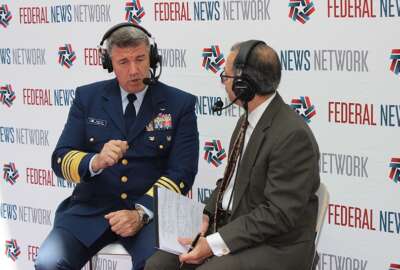
IT industry group calls for more uniform coronavirus lock down guidance
Facility lock downs are preventing essential contractor employees from access they need to help keep governments going.
Best listening experience is on Chrome, Firefox or Safari. Subscribe to Federal Drive’s daily audio interviews on Apple Podcasts or PodcastOne.
Facility lock downs and keeping everybody far away from everybody else, it’s all preventing essential contractor employees from access they need to help keep governments going. That’s the view of Jason Oxman, president and CEO of the Information Technology Industry Council. His association has called for uniform guidance across all of the countries battling coronavirus. He joined Federal Drive with Tom Temin for more.
Interview transcript:
Tom Temin: Jason, good to have you back.
Jason Oxman: Thanks Tom. Good to be with you.
Tom Temin: Now, you’re calling for guidance not just for access to federal United States or government agencies worldwide, but also access to facilities that support the infrastructure of the nations correct?
Jason Oxman: That’s exactly right. You know, ITT workers across the federal government and the private sector are really responsible for our nation’s ability to address the current COVID-19 crisis. They’re enabling working from home distance learning for students are enabling cybersecurity for networks that are now reaching into our nation’s homes and not just businesses. So they really are crucial to the ability of our nation to address this crisis. And therefore, we need to make sure that they can continue to build, repair and operate these critical technology networks and systems.
Tom Temin: I guess one of the implications we need to be reminded of is that even wireless networks eventually depend on wires connected to boxes with electricity running through them.
Jason Oxman: That’s a great example of the critical infrastructure that is keeping our nation running workers who repair and upgrade facilities for wireless networks, wireless networks with wireline broadband networks as well are facing unprecedented traffic volume and the need is there to make sure those networks not only can address that volume, but also are functional or repaired where a fiber optic cable breaks, for example, and we need to make sure workers can get to those facilities keep those networks running because it’s really what’s making it possible for us to work from home or learn from home.
Tom Temin: Given that requirement, what is the situation so far that you’ve seen?
Jason Oxman: So what we’ve seen at the federal level is CISA, the arm of the Department of Homeland Security that’s responsible for cybersecurity and infrastructure security has issued federal guidelines for essential workers. So essentially, these are guidelines that apply to the question of whether a worker is essential. So when a state or a locality issues a quarantine order, these essential workers can still get to the office can go to their critical jobs. CISA has included technology workers of the sorts that we’re talking about in that guidance. And we’re calling on states to adopt that guidance from Cisco to make sure that technology workers can get to their critical facilities, continue to make these products and services available to Americans.
Tom Temin: Is there any evidence that they have not been able to at this point?
Jason Oxman: So CISA has done a terrific job of making that guidance available? They’ve gone through two iterations of it. They’ve published it for states, many states have adopted that guidance wholesale. Some states have adopted it in part, some states are still working through the process. And to your question, there are some examples from ITI member companies that have told us that some of their employees have been stopped on the way to work to critical infrastructure facilities by law enforcement that weren’t aware of these guidelines and aware of the importance of providing technology company employees, an exemption to the quarantine or the stay at home order.
Tom Temin: Because those of us say in broadcasting, like what I’m doing right now, I have an essential employee designation letter from CISA, although I can say in the state of Maryland, I haven’t seen anyone stopped for any purpose. So it sounds like an uneven situation across the country, if people just driving to work are pulled over by law enforcement wondering why they’re on the road.
Jason Oxman: I think that’s exactly what it is. And it’s you know, law enforcement obviously doing their job and trying to enforce state orders and you mentioned Maryland which has done a great job of incorporating system The guidance but of course Maryland also has issued subsequent orders that authorized local health officials to act against business or facilities in certain instances, even if those businesses are otherwise permitted to stay open because being deemed essential. So there’s a little bit of confusion in the market as you as you suggested, but what we’re really working toward it, ITI is making sure that this CISA guidance is followed as broadly as possible. So essential facilities, which of course include broadcasting because of the crucial local news you provide, we want to make sure that guidance is followed.
Tom Temin: Any evidence coming in from any of your members that service for example, wireline or wireless service or internet service has suffered as a result of people not being able to get in.
Jason Oxman: Well, I think we’re lucky thus far networks are very robust services that ITI member companies provide are very robust, are working very well are meeting the additional demand that telecommuting and are learning from home and telehealth services are pushing on the networks. There are some examples of workers who have been stopped on the way to production lines. What we’re really concerned at this point about, in addition to the repairs that may be necessary or upgrades that may be necessary, is ensuring the supply chain. For example, you can imagine, most Americans who are working for home are looking for technology to support that they’re buying laptops, and tablets are buying mobile devices, they’re buying other technology for home, we need to make sure the supply chain is robust. So we can replace those critical technology products that may be in higher demand than usual at this time of year. So we need to make sure that semiconductor companies can continue to make semiconductors, the crucial components that go into those products, we need to make sure the supply chain is robust. So that’s kind of the next phase of concerns that we have.
Tom Temin: It also concerns me that this could affect federal contracting at federal agencies. The example that comes to mind is say the Army Corps Engineers, which has been building all of these temporary hospital facilities all over the place. I think they built 1000 beds into a mall in Minnesota, for example. And they have a whole list of them at their site. Those all require contractors really to do the work. And I imagine even building a temporary hospital makeshift facility requires a lot of wiring and a lot of internet connections and drops.
Jason Oxman: It’s a great example and a great reminder of how important it is that this guidance include not only employees, but also contractors. The example you gave of the federal government relying on contractors for these critical facilities is a good one. And of course, the private sector relies on contractors as well. We have urged and CISA has been very responsive to ensuring that guidance includes both employees and contractors for the reason that these contractors are even more important than they ever have been. And we need to make sure that they can access critical facilities just as full time employees.
Tom Temin: And what kind of response have you had on Capitol Hill to this requirement that you’re putting out for this uniform guidance.
Jason Oxman: We’ve been very pleased with the response on Capitol Hill. Congress has been very supportive of CISA’s efforts. Chris Krebs, who’s the Director of NASA has a phenomenally positive reputation on Capitol Hill. Congress looks to him for guidance in this area. And we’ve been very pleased with the support the Congress has provided here. Of course, Congress itself is working remotely, congressional staffer are generally working remotely and Congress has been in and out of session. But of course, we’ve seen the importance of remote access for different branches of government as well. It also raises the important area of cybersecurity and ensuring that we can secure all of these networks. That’s another critical area and one that we’ve seen Congress be interested in when we’ve seen CISA a focus on ensuring that cybersecurity workers can get to their points of work to secure networks as well.
Tom Temin: And I guess I should ask about the idea of teleworking using applications that contractors and federal agencies each are using and maybe to interact with one another To those who’ve been deemed too insecure to be able to use, I wonder how that’s hindering things?
Jason Oxman: Yeah, it’s been it’s been interesting. We’ve seen a lot of interest in applications that generally have not been used for these kinds of purposes that now are. Look, this all came upon us very quickly, we had to adjust and adapt almost with the turn of a page so a lot of this is new, but it does raise the importance of cybersecurity. We’ve seen large technology companies, IPI member companies that have really stood up to the the capabilities of their services in this crucial time. One area that we’ve seen that really prominently is in video conferencing, so everybody that participated in events or meetings or conferences is doing so remotely. We’ve seen products like Microsoft Teams, Amazon Chime and and others really take off. And those companies are investing enormous resources and intellectual capital into securing those services. And we’ve seen, you know, on Capitol Hill, the house Senate Sergeant at Arms. We’ve seen administration agencies really express a preference for those robust services from established companies. And we’ve seen usage increases as a result. And that’s good because we want these services to be secure. We need them to be functional because they’re enabling things that we never needed to do before. Well, let’s hope they’re all easier to use than Skype. That’s for sure.
Tom Temin: Jason Oxman is president and CEO of the Information Technology Industry Council. Thanks so much for joining me,
Jason Oxman: Tom, thanks for the opportunity.
Copyright © 2025 Federal News Network. All rights reserved. This website is not intended for users located within the European Economic Area.
Tom Temin is host of the Federal Drive and has been providing insight on federal technology and management issues for more than 30 years.
Follow @tteminWFED




